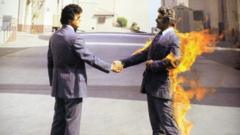The announcement of Netflix's live-action adaptation of the popular anime "Solo Leveling" ignites skepticism among fans, questioning the ability of studios to accurately translate anime's unique artistry. While past adaptations have faced significant backlash, the booming anime market continues to drive studios towards attempting to capture its magic in live-action form, reflecting an evolving landscape of viewership and cultural acceptance.
The Chaotic Dance of Live-Action Anime Remakes: Fans Remain Skeptical Yet Studios Persist

The Chaotic Dance of Live-Action Anime Remakes: Fans Remain Skeptical Yet Studios Persist
Despite a tumultuous history and mixed fan receptions, studios continue their pursuit of live-action adaptations of beloved anime series, seeking fresh engagement and wider audiences.
As Netflix embarks on the journey of bringing "Solo Leveling" to live-action life, the response from fans has been overwhelmingly cautious, reflecting a broader skepticism regarding anime adaptations. Originally a hit Korean web novel, "Solo Leveling" gained massive popularity as an anime series, illustrating the classic underdog tale of monster hunter Sung Jin-woo who rises from obscurity to power. However, the typical trepidation surrounding live-action remakes persists.
Fans like Andre Denisson from Sweden express doubt about the ability of CGI to faithfully recreate the stunning visual effects of the original anime. "The anime looks incredible, mainly because of the fight sequences, which could be hard to replicate in live-action," he remarks. The narrative follows hunters battling magical monsters, and fans fear the essence of the story may be lost in translation.
Geoff Thew, a prominent anime reviewer, notes that adapting animated features into live-action form poses a tremendous creative challenge. "Dramatically and aesthetically, what works in animation does not always translate seamlessly into live action," he notes, emphasizing the importance of retaining iconic moments recognizable to fans, despite the inherent differences between the two mediums.
Hollywood’s initial attempts at adapting anime began in the 1990s, with disastrous results like the widely criticized "Dragonball Evolution" and the poorly received "Ghost in the Shell." Nevertheless, despite mixed historical reception and heavy criticism, Hollywood continues to explore opportunities in this lucrative market, with ongoing projects including adaptations of "Gundam" and "Naruto."
The growing anime market's value — projected to exceed $60 billion — underscores the industry's determination to tap into this profitable demographic. Netflix reports a significant increase in anime viewership among its 300 million subscribers, indicating a ripe opportunity for fresh content that perhaps embodies the anime aesthetic in a more accessible format.
Many fans, like Parisa Haghighat, have noticed a shift in societal perception of anime, transforming from a niche interest to recognizing its broader appeal. The pandemic played a crucial role in this shift, facilitating exposure and acceptance of the genre as audiences sought alternatives to conventional Hollywood storytelling.
In light of these insights, it's puzzling that studios continue to invest in live-action adaptations when the original animated forms stand strong. Analysts suggest that studios like Netflix view these adaptations as opportunities to engage audiences who might later explore the original works, thus prolonging engagement.
Despite criticism and the weight of past failures, Netflix appears to be taking lessons into account, as demonstrated by the success of its recent adaptation of "One Piece," which received acclaim for its more authentic approach. With a Korean cast and crew attached to "Solo Leveling," hope arises that the adaptation will maintain the story's cultural and narrative authenticity, allowing a fresh audience to explore the rich world of the original story.
As anticipation builds, fans maintain cautious optimism that the key action and character moments will resonate, hoping to see an engaging adaptation that honors the spirit of "Solo Leveling" while introducing a wider audience to its thrilling universe.




















